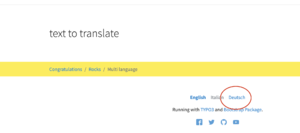Typo3/Frontend Localization: Unterschied zwischen den Versionen
Erscheinungsbild
K Dirkwagner verschob die Seite Typo3:Frontend Localization nach Typo3/Frontend Localization, ohne dabei eine Weiterleitung anzulegen: Textersetzung - „:“ durch „/“ |
|||
| (15 dazwischenliegende Versionen von 2 Benutzern werden nicht angezeigt) | |||
| Zeile 1: | Zeile 1: | ||
TYPO3 CMS comes with the built-in ability to handle web sites in multiple languages. | |||
=Adding a new language= | =Adding a new language= | ||
==Make a new language available== | ==Make a new language available== | ||
Add a new language available for the website development | |||
[[Datei:Schermata 2021-02-24 alle 16.31.57.png|mini|ohne|Add the new language]] | [[Datei:Schermata 2021-02-24 alle 16.31.57.png|mini|ohne|Add the new language]] | ||
*Choose and configure the language that you want to add | *Choose and configure the language that you want to add | ||
[[Datei:Schermata 2021-02-24 alle 16.34.57.png|mini|ohne|Choose the language you want to make available]] | [[Datei:Schermata 2021-02-24 alle 16.34.57.png|mini|ohne|Choose the language you want to make available]] | ||
Save>Close | |||
==Activate the new language | |||
==Activate the new language== | |||
*Enter in the site management>Sites - This module is limited to admin users only | *Enter in the site management>Sites - This module is limited to admin users only | ||
[[Datei:Schermata 2021-02-24 alle 15.38.43.png|mini|ohne|Module Site management]] | [[Datei:Schermata 2021-02-24 alle 15.38.43.png|mini|ohne|Module Site management]] | ||
| Zeile 19: | Zeile 21: | ||
[[Datei:Schermata 2021-02-24 alle 16.10.54.png|mini|none|Language fields to set]] | [[Datei:Schermata 2021-02-24 alle 16.10.54.png|mini|none|Language fields to set]] | ||
*Now you can work with the new language and make the website multi language | *Now you can work with the new language and make the website multi language | ||
=Translate the website pages= | =Translate the website pages= | ||
*To translate the pages of your website enter in the Page module and select the page you want to translate in the tree section | *To translate the pages of your website enter in the Page module and select the page you want to translate in the tree section | ||
| Zeile 26: | Zeile 29: | ||
*Don't forget to update the page URL | *Don't forget to update the page URL | ||
[[Datei:Schermata 2021-02-24 alle 16.48.19.png|mini|ohne|Language edit of the page]] | [[Datei:Schermata 2021-02-24 alle 16.48.19.png|mini|ohne|Language edit of the page]] | ||
*Save>Close | |||
*Now you will be able to see the 2 versions of the page, in both the languages you need | |||
*Be sure to select the Languages view | |||
[[Datei:Schermata 2021-02-24 alle 16.52.09.png|mini|ohne|In the 2 columns you can see the contents for the page in English and German]] | |||
*Now you have to translate the contents. To do so click on the button "Translate" | |||
[[Datei:Schermata 2021-02-24 alle 16.54.45.png|mini|ohne|Translate button]] | |||
*It is possible to choose between the options: | |||
#Translate: will create a direct connection between the original language and the language you translate to. | |||
#Copy: You are freer to design your website. More recommended | |||
*With the option Copy the software will generate a copy of the content that you will have to edit and translate in the new language | |||
*The new content is in Light grey color because it is not enabled. Remember to enable the content if you want to see it in the frontend | |||
[[Datei:Schermata 2021-02-24 alle 17.10.59.png|mini|ohne|Click on edit to translate the page in a new language]] | |||
*In the edit section of the new page you can translate the contents and set everything as you wish | |||
[[Datei:Schermata 2021-02-24 alle 17.15.14.png|mini|ohne|Contents translation]] | |||
*Save>Close | |||
=View the translated pages in the frontend= | |||
*To see if your changes work as you wish on the frontend, click on the view mode | |||
[[Datei:Schermata 2021-02-24 alle 17.19.26.png|mini|ohne|View mode]] | |||
*Change the language of the website into the one you are working with | |||
[[Datei:Schermata 2021-02-24 alle 17.21.08.png|mini|ohne|Choose the language]] | |||
[[Kategorie:Typo3]] | |||
Aktuelle Version vom 29. März 2023, 12:24 Uhr
TYPO3 CMS comes with the built-in ability to handle web sites in multiple languages.
Adding a new language
Make a new language available
Add a new language available for the website development

- Choose and configure the language that you want to add
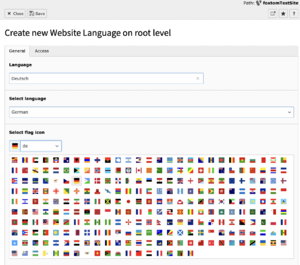
Save>Close
Activate the new language
- Enter in the site management>Sites - This module is limited to admin users only
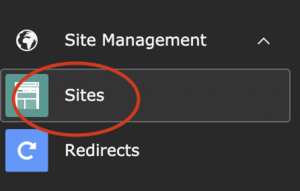
- Click on edit Site configuration

- In the big square are shown the available languages for the website
- Just click on the one that needs to be added to the website and it will be instantly be available.
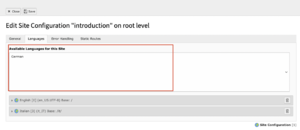
- Be sure that all the fields are properly configured
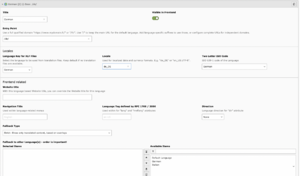
- Now you can work with the new language and make the website multi language
Translate the website pages
- To translate the pages of your website enter in the Page module and select the page you want to translate in the tree section
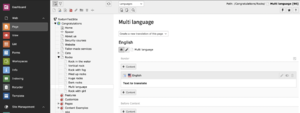

- The next step is to edit the new language name of the page
- Don't forget to update the page URL
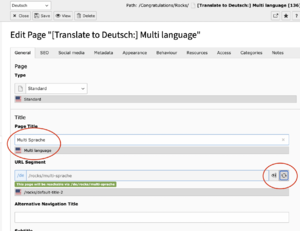
- Save>Close
- Now you will be able to see the 2 versions of the page, in both the languages you need
- Be sure to select the Languages view
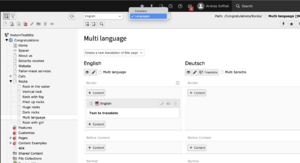
- Now you have to translate the contents. To do so click on the button "Translate"
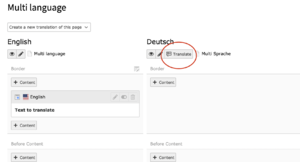
- It is possible to choose between the options:
- Translate: will create a direct connection between the original language and the language you translate to.
- Copy: You are freer to design your website. More recommended
- With the option Copy the software will generate a copy of the content that you will have to edit and translate in the new language
- The new content is in Light grey color because it is not enabled. Remember to enable the content if you want to see it in the frontend
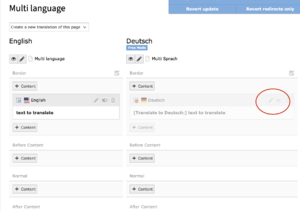
- In the edit section of the new page you can translate the contents and set everything as you wish
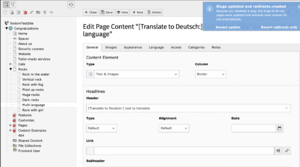
- Save>Close
View the translated pages in the frontend
- To see if your changes work as you wish on the frontend, click on the view mode
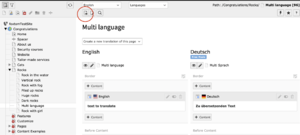
- Change the language of the website into the one you are working with
